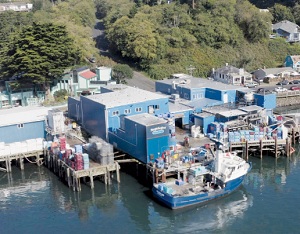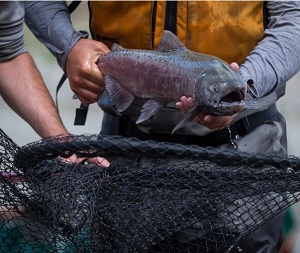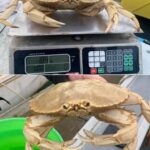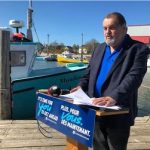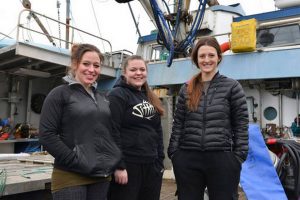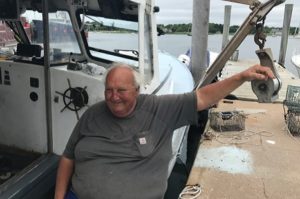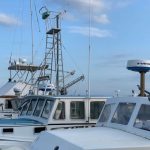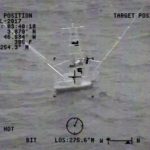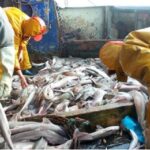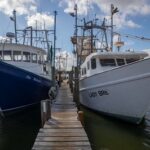Category Archives: Pacific
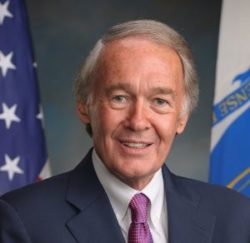
Fighting for fishermen on a bi-partisan, bi-coastal basis during Coronavirus crisis – Senator Ed Markey
Restaurants have shuttered and large export markets have been disrupted. Fishermen have lost access to critical points of sale and sources of income. With a decreased demand for fresh seafood, many boats sit idle in port. Meanwhile, boat payments are due and families need to be fed. In the U.S. Senate, I have been fighting on a bipartisan basis alongside Sen. Elizabeth Warren and Alaska senators Lisa Murkowski and Dan Sullivan to secure dedicated economic assistance for the fishing and seafood industries in COVID-19 economic relief packages. Thankfully, this bi-coastal effort got results. The Coronavirus Aid, Relief, and Economic Security (CARES) Act, enacted into law on March 27, included $300 million in assistance for fishery participants and $9.5 billion for affected agricultural producers. >click to read< 12:22
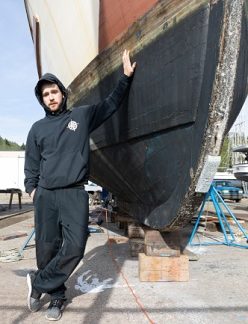
Fishermen’s Superstition’s: No bananas! No Whistling! But above all, it’s bad luck to be superstitious!
Luke Whittaker set out to learn whether there are superstitions that live on among local fishermen. Here’s what he heard. Jerry Matzen III, commercial fishermen “Hang your coffee cup mouth towards the stern so you don’t sink. And no whistling in the wheelhouse or cabin — otherwise you’ll whistle up a storm, like we are having today. I learned the coffee cup one from Kerry Suomela Sr. when I worked on the F/V Southern Cross and it always stuck with me.” Tim Teall, commercial fishermen “Well, to begin with, you never want to paint your boat green because it’ll beach itself in a storm. Never set a coffee cup or a bucket on the boat upside down — the boat will roll over! Don’t whistle in the wheelhouse, because it’ll make it get windy out. But above all, it’s bad luck to be superstitious!” >9 photos, click to read<10:41
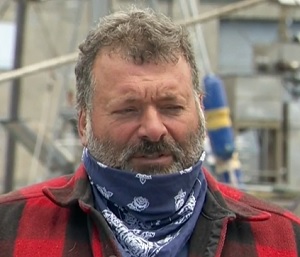
Fisherman’s Wharf: Restaurant threatens commercial fishing operation’s survival over a parking lot conflict
The parking area at Pier 47 could be used for al fresco dining as soon as next week but that space is where Giuseppe Pennisi, of Pioneer Seafoods, has been selling fresh-caught fish right off his boat for years. Now, the Port of San Francisco has ordered him to stop. “They said our business was causing problems for Scoma‘s but there’s no one even down here anymore except for people buying a few fish,” Pennisi said. Scoma’s owner Tom Creeden says they’ve submitted plans to Port of San Francisco officials to use the parking space for outdoor dining. Pioneer Seafoods will have to shut down its operations by June 15 after being given less than five days notice. It would also be a blow to Glide Memorial Church in San Francisco, which receives 3,000 pounds of fish from Pennisi every two weeks to feed the homeless. >video, click to read< 08:37
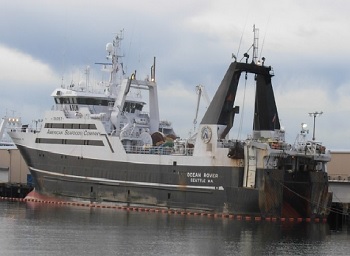
Crew of Alaska bound factory fishing trawler worries after company rejects more Coronavirus screening
American Seafoods will forgo additional COVID-19 screening of the Ocean Rover factory trawler, a move that has some crew worried and wanting more assurances the disease has not found its way onto the Alaska-bound vessel. American Seafoods has been buffeted in the past two weeks by test results from crews of three other vessels unloading frozen fish in Bellingham. Testing positive: 94 crew on the American Dynasty, four on the American Triumph and 21 on the Northern Jaeger, findings that rattled the North Pacific seafood industry, which is struggling to keep the virus off boats and shore-based plants as the busy summer harvest season approaches. >click to read< 18:48
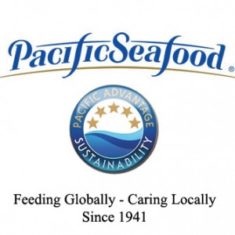
Pacific Seafoods Charleston branch unaffected by coronavirus
While the Newport branch of Pacific Seafood has recorded 124 positive cases of COVID-19, the Charleston branch of the same company has been unaffected. “The cluster of COVID-19 cases in Newport has not impacted our operations or team members in Charleston. No workers from Newport have relocated to Charleston, or to any other facilities,” said Lacy Ogan,,, Pacific Seafood in Charleston has reported that safety precautions are in place. These steps have included increased cleaning protocols, face coverings, daily temperature checks, staggered shifts to allow for less people together and restricted access provided to the facility. >click to read< 16:43
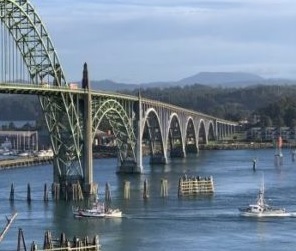
In Newport, a coronavirus outbreak spreads to local economy
Pacific Seafood ceased operations at all five of its Newport plants. The Oregon Health Authority said the outbreak is contained to Lincoln County and that risk to the public is low. But Newport Mayor Dean Sawyer said most of those who tested positive are locals. The town’s economy is hurting again without a major fish buyer and supplier. And businesses are shutting back down to try to slow the spread of the virus. “They live here, they work here, they’re community-based people,” Sawyer said. “And, of course, the problem with that is that people live and work with people that work in other industries.” >click to read< 12:16
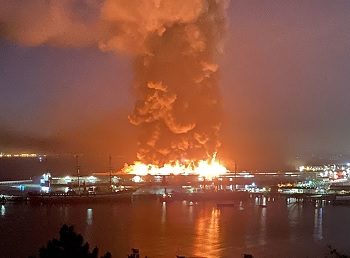
City Officials Announce Financial Relief Plan For Crabbers Impacted By Pier 45 Fire
Mayor Breed, the San Francisco Port Commission and Supervisor Aaron Peskin said they hope the financial assistance will ensure that a crab season happens this year. Some have called it the biggest disaster the San Francisco fishing fleet has ever experienced. More than 30 crabbers lost 8,000 crab, shrimp, and black cod traps pots during the four-alarm fire that ravaged Pier 45 on the morning of May 23. Shed C, which housed the vast majority of the crabbing community’s pots, was engulfed in flames and completely destroyed. The fire essentially brought the local crab fishing industry to a halt. >click to read< 19:29
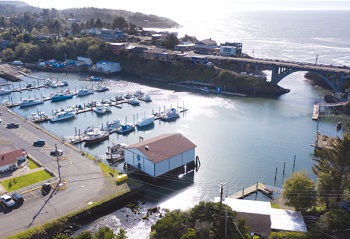
Depoe Bay Harbor: “Best Harbor in the U.S.”
The second annual contest to find the best harbor in the U.S. wrapped up on Sunday, May 31, with winners announced shortly thereafter. US Harbors, an online site for tides and weather, providing localized information on more than 1,400 harbors on the coast and Great Lakes,,,, Depoe Bay Harbor captured the most votes, and runners up in this year’s contest were Onset Beach, Mass.; Padanaram/South Dartmouth, Mass. (Best Harbor 2019); Boothbay, Maine; Cuttyhunk, Mass.; and Oriental, N.C.,, Depoe Bay, a picturesque harbor of only six square acres, claims the title of “smallest navigable harbor in the world.” It is both the whale-watching capital of Oregon, and home to a working fishing community. >click to read< 14:25
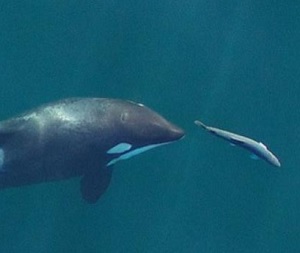
Judge weighs shutting down Southeast Alaska Chinook fishery
Fishermen in Southeast Alaska could see their season cut short if a federal judge issues an injunction requested by a Washington environmental group to protect the food supply of a subpopulation of orcas. The Wild Fish Conservancy filed a lawsuit against NOAA,,, “We are getting blamed for harvesting their food source, which really isn’t the cause of the problem,” Amy Daughery, executive director of the Alaska Trollers Association said. “The problem as we see it, is the exponential population growth in Seattle, which has lead to a lot of toxicity and pollution and habitat loss in that area. And so these whales are really struggling, this one population. The Northern killer whales that we see off the coast of Southeast Alaska are doing very well. In fact they’ve increased.” >click to read< 10:19
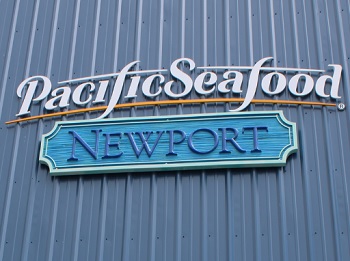
UPDATED: 124 cases reported – Pacific Seafood Coronavirus outbreak due to out-of-state workers, say former employees
James Nelson, a 10-year veteran at Pacific Seafood, said he had to quit his job May 8, “due to the COVID-19 virus,” and said he was forced to resign after expressing concern over the company bringing in “100+ migrant workers” from California to process seafood in Newport. Nelson said he would not put his family’s safety in jeopardy because implanting workers from a more contaminated area was too dangerous. He brought his concerns to managerial staff and said some had their own concerns, but they told him the higher-ups made the decisions. >click to read< 09:39
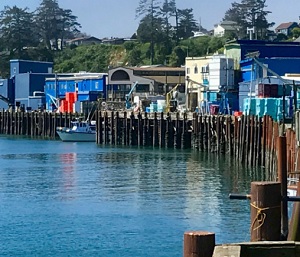 124 coronavirus cases reported at Pacific Seafood facilities in Newport – Pacific Seafood on Sunday disclosed that 124 of its employees and local contractors have tested positive for coronavirus in what is the second largest workplace outbreak of the virus in the state to date. >click to read< 10:43
124 coronavirus cases reported at Pacific Seafood facilities in Newport – Pacific Seafood on Sunday disclosed that 124 of its employees and local contractors have tested positive for coronavirus in what is the second largest workplace outbreak of the virus in the state to date. >click to read< 10:43
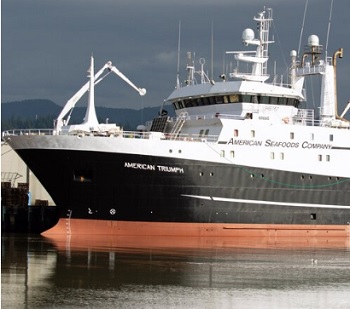
American Seafoods screening 2 more crews after most on third vessel test positive for Coronavirus
The new round of testing involves the crews of the American Triumph and the Northern Jaeger as they dock in Bellingham, according to a company statement. “We’re conducting these tests out of an abundance of caution,” said Mikel Durham, the company’s chief executive. All three of American Seafoods’ vessels had been participating in the Pacific whiting harvest off the Northwest coast with large crews onboard to operate the vessels and equipment that processes and freezes the catch. Last week, a crew member of the American Dynasty tested positive and was hospitalized in Bellingham. A subsequent screening of other crew determined that 85 were positive. >click to read< 16:42
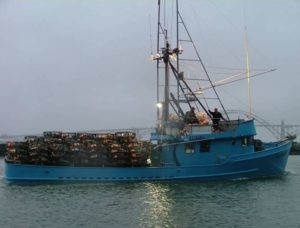
Oregon Fishing Industry Tells Lawmakers Of Economic Hardships – Murkowski pushes for an another Billion in federal fisheries relief funds
The coronavirus has hit Oregon’s commercial fishing industry hard. That was the message to state lawmakers during a recent meeting of the House Interim Committee on Natural Resources. Anthony Dal Ponte is with Pacific Seafood, which is based in Clackamas and has several facilities on the Oregon coast. He said the company had to lay off more than 500 employees after their restaurant and hospitality industry markets dried up virtually overnight. >click to read< Meanwhile, Murkowski pushes for an additional $1 billion in federal fisheries relief funds – Additional money could 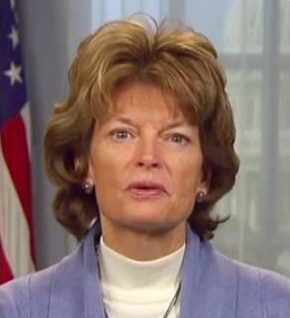 be on the way for the fishing industry. Senator Lisa Murkowski said that she is working to add more fisheries funding in the next round of pandemic relief legislation. “As we think about the impact to our fisheries, $50 million is not going to be sufficient to address the need,” she said. “I have been working with colleagues to urge us in this next round of relief to include $1 billion in fishery assistance funds.” >click to read< 15:07
be on the way for the fishing industry. Senator Lisa Murkowski said that she is working to add more fisheries funding in the next round of pandemic relief legislation. “As we think about the impact to our fisheries, $50 million is not going to be sufficient to address the need,” she said. “I have been working with colleagues to urge us in this next round of relief to include $1 billion in fishery assistance funds.” >click to read< 15:07
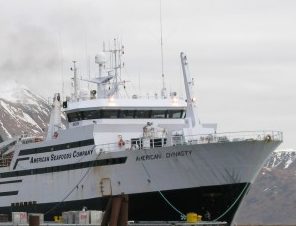
UPDATED: 86 crew members of F/V American Dynasty test positive for Coronavirus
Eighty-six crew members of the American Dynasty trawler that docked in Bellingham last week have tested positive for COVID-19, according to operator American Seafoods in a press release Sunday evening, May 31. Nine tests are still outstanding. The Seattle-based crew are not showing symptoms of the disease and stayed on the ship when it was in Bellingham, according to American Seafoods. The American Dynasty has returned to the Port of Seattle and is under quarantine, the press release said. >click to read< 07:22
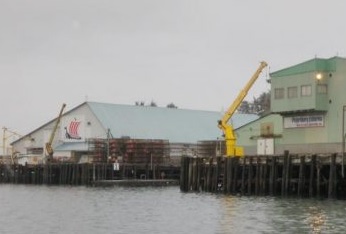
Icicle Seafoods, Ocean Beauty Seafoods merge salmon processing operations operations
Two of Alaska’s largest seafood companies are merging their salmon processing businesses. Icicle Seafoods and Ocean Beauty Seafoods will be combining forces to create OBI Seafoods. Talks of a potential merger have been circulating for months. There’s been speculation in the seafood industry press that the two Seattle-based companies are seeking to remain competitive against the other major industry players in Alaska. The two companies have very different ownership. Half of Ocean Beauty is owned by the Bristol Bay Economic Development Corporation. The other is a small group of Outside investors. Icicle on the other hand was bought by privately-held Canadian giant Cooke Seafoods in 2016. “The majority of — I don’t want to say majority — but a big chunk of the Alaska salmon processing sector is now partly owned or partly controlled by a major salmon farming company,” >click to read< 09:35

Trawler docked in Bellingham testing 100-plus crew for Coronavirus after 1 hospitalized
More than 100 crew members of the American Dynasty trawler docked in Bellingham are being tested for COVID-19, a ship spokesperson said Saturday, May 30. One crew member from the American Seafoods fishing vessel tested positive for the new coronavirus and was admitted to St. Joseph hospital Friday, May 29, for treatment, according to a Friday evening news release from Whatcom Unified Command. The ship docked in Bellingham Thursday, May 26, according to unified command, the multi-governmental agency that’s directing local new coronavirus pandemic response. >click to read< 17:18
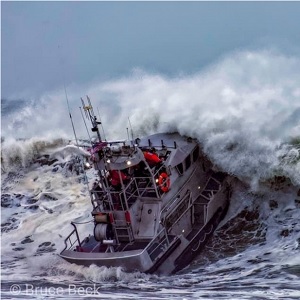
The Creed
Years ago a visitor from Central Oregon stood on the Depoe Bay Bridge, which runs along the Pacific Coast Highway, otherwise known as State Highway 101. She looked out to see a silver boat zipping around in the ocean, and thought to herself ‘that looks fun and I want to drive that boat.’ “I had no prior knowledge of the Coast Guard, but at that time in my life I was looking for a purpose,” said Petty Officer 2nd Class Kelsi Dozier, (surfman #561) from Coast Guard Station Yaquina Bay in Newport, Oregon. “After that family vacation to Depoe Bay and a little video research on YouTube, I reached out to a Coast Guard recruiter.” The Coast Guard has certified 10 surfmen during the past 8 months. In order to earn the surfman qualification a Coast Guard coxswain requires a lot of hours at the helm while operating in the surf. Excellent photo’s, great story. >click to read< 15:34
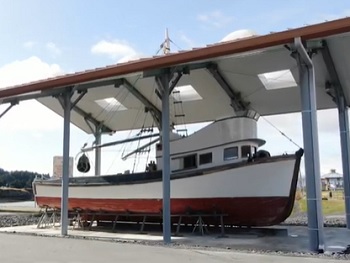
Historic fishing vessel finds home in star-built pavilion
The Thelma C was built in 1965 for the original owner, Ken Cristoffersen, by Commercial Marine in Seattle, Washington, from a design by marine architect William Garden. Utilizing a Federal relief loan to build the Thelma C following the destruction of his original vessel, the Christine, during the 1964 Great Alaskan Earthquake and tsunami, Cristoffersen went on to fish off the Thelma C until his retirement. Subsequent owners continued to use the boat for fishing purposes until 2006 when its last working owner, fisherman Mark Thomas, donated it to Kodiak Maritime Museum.,, Following the ship’s donation, plans began on the construction of a long-term exhibition site. Video, >click to read< 10:54
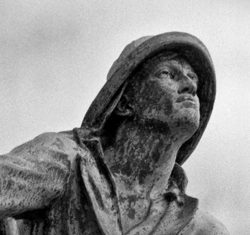
NOAA – Their mission
Back in the sixties when I was fishing with my dad we would fish about a one hundred miles east of New Bedford for whiting in the spring. We had a ninety foot dragger. And there were Russian vessels there that were three hundred foot and they were using a small mesh net that caught everything in the water. At the time there was no 200 mile limit. The Russians and other foreign vessels could come into our waters and were restricted to within fifteen miles of our coast. Today no one knows how much damage they did but our fisherman would eventually pay the price. Finally in 1978, we enacted the 200 mile limit. That was great so we thought, but we created a monster. That being NOAA. >click to read< Thank You, Sam Parisi 08:52
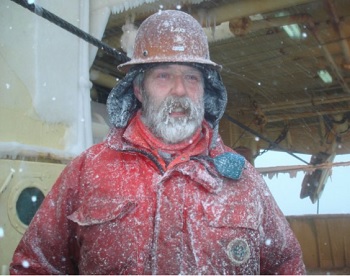
Lars Petter Austnes: Longtime commercial fisherman was known for his big heart, Viking spirit, has passed away
Lars Petter Austnes of Edmonds, Washington passed away on April 29, 2020 at the age of 64. Lars was born October 2, 1955 in Ålesund, Norway, the third child of four to his parents Edvin and Henrikke Austnes. In 1985, he moved to Ballard in Seattle, Washington to work with other Norwegian fishermen in the growing Alaskan Pollock industry in the Bering Sea. Upon arrival, he began his long employment for Glacier Fish Company, owned by the heroic leader and friend, Erik Breivik. He started on the company’s Northern Glacier Catcher/Processor as a Bosun. Lars Lars married Kim Starwich of Ballard October 19, 1991. Lars and Kim have been residents of Edmonds since 1990 and have two daughters, Annika (25) and Kristin (24). He loved and cherished his wife, girls, and dogs dearly. >click to read< 21:20
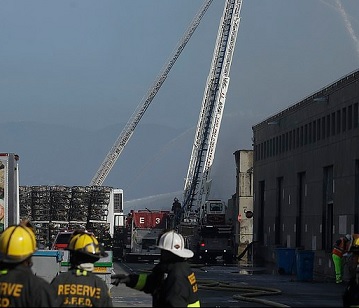
Dramatic footage reveals full extent of damage from massive fire that tore through warehouse on San Francisco’s Fisherman’s Wharf
Dramatic photos have revealed the full extent of damage from a fire that engulfed a warehouse on San Francisco’s Fisherman’s Wharf early Saturday morning. Pictures taken after the blaze was extinguished show the structure destroyed by the fire, with its walls and roof collapsed. The blaze broke out shortly before dawn, sending a thick plume of orange smoke out across San Francisco Bay. Later in the morning, dozens of firefighters were seen surveying the smoldering building as smoke continued to billow across the city. lots of photos, video, >click to read< 13:52
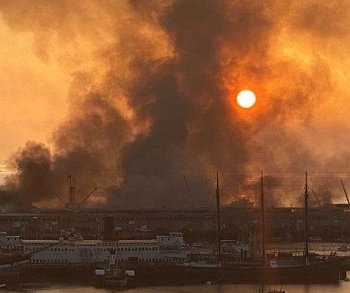
Fire Tears Through San Francisco’s Pier 45 Fishing Offices, Equipment at Fisherman’s Wharf
The four-alarm fire at San Francisco’s Pier 45 will put a real strain on the fish and crab industry that’s an important part of Fisherman’s Wharf. Several dozen fishing businesses are located on the rear of the pier, including offices, vehicles and equipment. Hundreds of thousands of crab pots were lost at a cost of more than $300 apiece, leading to a burned plastic smell in the area. The fishermen and crab fleet keeps most of their gear at Pier 45. “It’s a complete wipeout for the majority of the crab fleet there,” California Coast Crab Association President Ben Platt told KCBS Radio. >click to read or listen< 22:31

BREAKING: Crews battle 4-alarm fire at San Francisco’s Pier 45 at Fisherman’s Wharf
Crews are battling an enormous fire a San Francisco warehouse on the city’s iconic Pier 45 at Fisherman’s Wharf Saturday morning. Firefighters told our sister station KGO-TV that additional structures and the SS Jeremiah O’Brien ship are threatened. The ship is one of two remaining fully functioning Liberty ships launched during World War II. It’s unclear what ignited the flames. Crews say no one has been hurt. The fire was first reported around 4:40 a.m. local time. As of 5:49 a.m., the fire department said crews were making progress on the flames. >click to read< 09:22
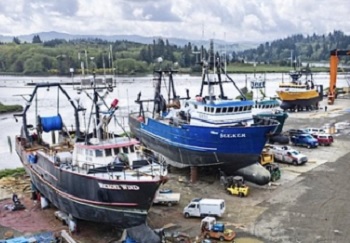
Something Big is in the works at the Port of Toledo’s Shipyard, Repair work continues, unabated!
JH Kelly ironworker crews are close to half way through the job of constructing the port’s towering new work building. When completed later this year this year the $5.1 million, 90-foot tall structure will provide the yard with a contained, all weather environment to conduct painting, sandblasting, welding, and other work. Repair work at the Toledo yard has continued unabated despite the ongoing national health crisis and its impact on the larger economy. >click to read< 14:17
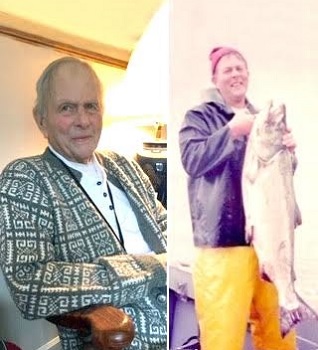
Boatbuilder Ralph Howard Sorensen Jr.
Ralph was born in Edmonds, WA, and maintained his home there, graduating from Edmonds High School in 1946. He attended Everett Community College before being called to serve his country in the Korean War,,, He went on to became an apprentice boat builder at Howard Anderson Boat House, which later became Anderson Marine next to the Edmonds ferry terminal. Ralph specialized in building commercial fishing boats. He started his own boat shop called Tidewater Boat Works, where he built gillnetters, trollers, seiners, and did repairs on sailboats or anything that floated and was made out of wood. >click to read< 09:07
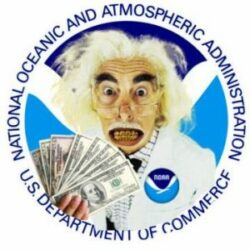
Eight Projects Selected for S-K Funding – Here we go again! Fisherman get the shaft, thanks to NOAA
To those fisherman who put in an application for Saltonstall-Kennedy Program Funding money, I feel badly for you who were not selected. Again, NOAA gave the money to universities, foundations, and other special interests and not you, who it should be for. Unfortunately for those who applied, this has been going on for years under NOAA’s selection of those that apply. I believe when authored by Senators Leverett Saltonstall (R-Mass.) and John F. Kennedy (D-Mass.) in 1954 to promote and market domestic seafood, that they didn’t think our fisherman would be left out. Two years ago, I was chosen by NOAA to serve on a panel to review those who applied.,, by Sam Parisi, >click to read< including the press release. 19:12
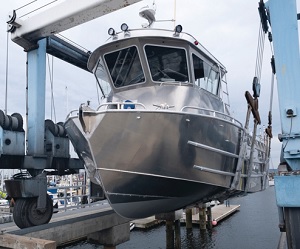
Port of Port Townsend: Marine trades plan for reopening in Phase 2
When the governor first announced his “Stay Home, Stay Healthy” order, boat builders in Port Townsend put down their sanders, chisels and saws and headed home. But as the fishing season drew closer, and Alaskan towns began to institute two-week quarantines for incoming boats, crews scrambled to get their fishing vessels ready. On March 30, Gov. Jay Inslee said marine trades businesses could continue to work on commercial fishing vessels in addition to government and transportation vessels. “I don’t think there’s any debate that the marine trades have been essential workers throughout the closure,” said Eron Berg, director of the Port of Port Townsend. While the port scaled down haulouts, marine trades businesses scaled down to just working on commercial fishing vessels. ACI Boats, a boat construction company at the port’s boat yard, launched a newly built commercial fishing vessel that will head to Bristol Bay amid the pandemic. >click to read< 17:39
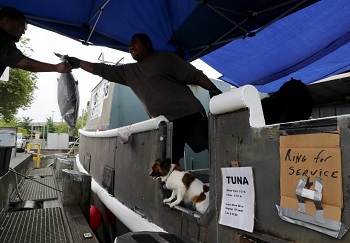
‘Baboom!’ St. Jude returns with 48 tons of tuna and no restaurant market thanks to coronavirus so they are selling it at Seattle’s docks
When the tuna boat St. Jude motored out of Anacortes in November for fishing grounds 5,000 miles away in the South Pacific, few people outside of microbiology labs had ever heard the word “coronavirus.” By the time the 95-foot vessel docked in Seattle this month, the microbe had shaken the entire world and turned the seafood business upside down. “Baboom!” said owner and captain Joe Malley, who returned from the six-month voyage to find the primary market for his high-quality albacore had vanished. “Who could have anticipated this?” >click to read< 11:19
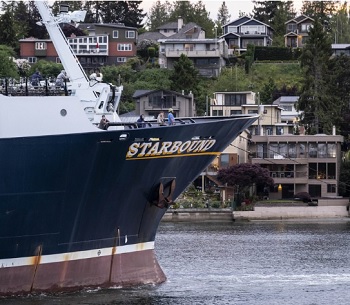
Trawl fishing in the age of the coronavirus: First, you make it through quarantine
Hundreds of crew members went through two weeks of shore-side quarantine coupled with testing for the novel coronavirus that did identify a few who, if they had gone out to sea, risked sickness and spreading the virus. “There’s no silver bullet. But this is a huge deal,” said Karl Bratvold, a managing partner of Aleutian Spray Fisheries, which operates the catcher-processor vessel Starbound now harvesting whiting in open waters off the Olympic Peninsula. “We have a steady crew. And I’m glad they came back. They work in tight quarters and it’s scary out there. We had to do what we had to do to keep these people safe.” photos, >click to read< 13:27






